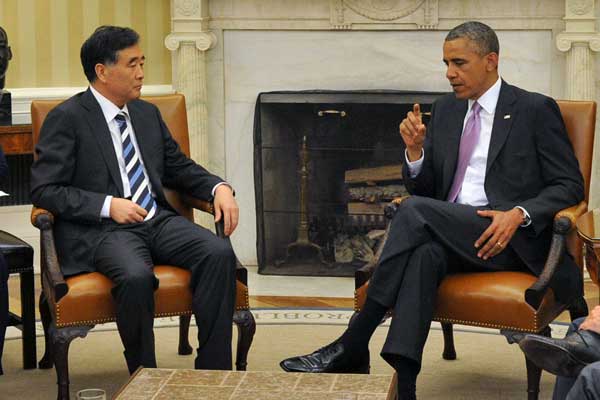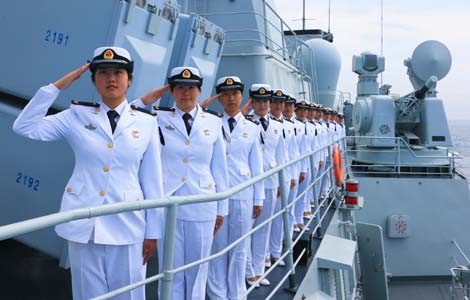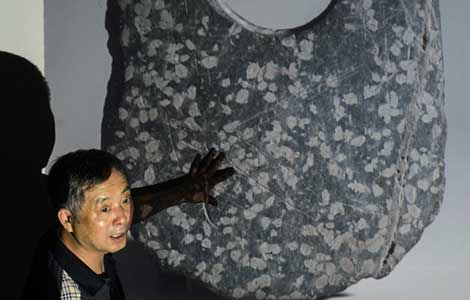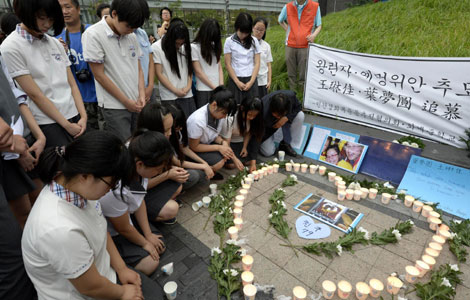Key investment talks to restart
Updated: 2013-07-13 00:57
By CHEN WEIHUA in Washington and LI XIAOKUN in Beijing (China Daily)
|
||||||||
In a major breakthrough, China and US agree to begin 'substantive negotiations'
Beijing and Washington agreed on Thursday to restart stalled negotiations on an investment treaty, a move hailed as a significant breakthrough resulting from the annual Strategic and Economic Dialogue.
Observers said the agreement comes as China shows a willingness to open up more sectors to foreign competition and the United States shows its commitment to treat Chinese enterprises fairly.
 |
|
US President Barack Obama meets the two Chinese co-chairmen at the China-US Strategic and Economic Dialogue, Vice-Premier Wang Yang and State Councilor Yang Jiechi (first left) at the White House on Thursday. Obama praised the positive results of the talks. WANG LEI / XINHUA |
Such efforts will finally bring tangible benefits to the people of both countries, they said.
According to a statement issued by the Foreign Ministry after the Strategic and Economic Dialogue talks ended in Washington on Thursday, the two sides agreed to begin "substantive negotiations" on a bilateral investment treaty.
The statement said the US pledged to treat Chinese investment equally and fairly and to welcome investment from China, including that from State-owned enterprises.
"China announced its intention to negotiate a high-standard bilateral investment treaty with us that will include all stages of investment and all sectors — a significant breakthrough and the first time China has agreed to do so with another country," US Secretary of the Treasury Jack Lew said as the talks ended.
The US also promised that the review by the Committee on Foreign Investment in the United States, an inter-governmental agency that examines foreign direct investment, will be limited to national security and nothing else, such as economic policy or other national policies.
Chinese companies seeking to invest in the US often fear a political backlash in the US Congress or rejection on national security grounds.
Commerce Minister Gao Hucheng told reporters China and the US share "a common purpose, which is to try to find ways to reduce and mitigate differences and barriers that both sides place in our trade and investment relations".
Explaining China's motives for reopening the investment talks, Vice-Minister of Finance Zhu Guangyao said the country has about $20 billion of direct investment in the US and $1.2 trillion in US Treasury bills.
"With such an extensive investment relationship, it is necessary for the two sides to have an institutional environment for the protection of these investments," he told reporters.
"Business leaders from China and the United States have a strong desire to invest in each other's market. They both want an open and more transparent market," Zhu said.
Sun Zhe, director of the Center for US-China Studies at Tsinghua University, said the significance of restarting the talks also lies in the fact that "China now seeks higher requirements of itself", adding, "It can also be seen as a psychological breakthrough for China."
Sun said such efforts in this round of the S&ED talks were not restricted to the economic field but stretched to discussions with the US in various areas ranging from State-owned enterprise reform to innovation in the healthcare system.
"That will finally greatly benefit the Chinese people. And the Americans will also get many jobs from Chinese investment coming to the US."
Kenneth Lieberthal, a senior fellow at the John L. Thornton China Center of the Brookings Institution, said, "The announcement of the restarted talks, which is potentially one of the most important economic issues as we look to the future of US-China relations, highlights the value of the S&ED discussions."
This round of the S&ED talks was co-chaired by four new faces, Vice-Premier Wang Yang, State Councilor Yang Jiechi, US Secretary of State John Kerry and Secretary of the Treasury Jack Lew.
It follows the consensus reached a month ago by Presidents Xi Jinping and Barack Obama at Sunnylands, California, to push forward a new type of major country relationship.
Addressing a second-day session of the S&ED on Thursday morning, Yang said the two countries have become intertwined in their relationship.
Yang, a former ambassador to the US, called on both sides to discard the zero-sum mindset that one country's gain is at another country's loss.
US Deputy Secretary of State William Burns said both sides "must continue to move beyond this historical conflict between rising and established powers".
Obama met Wang and Yang on Thursday at the White House. Wang delivered a letter from President Xi, who lauded the achievements made at the two-day S&ED.
Obama said he has full confidence in the future of ties between the two nations.
Other achievements
Among a full basket of achievements at the talks, the US has agreed to increase investment and saving rates while cutting deficits in order to achieve medium-term fiscal sustainability.
It also promised to pay greater attention to the spillover and global ramifications of its monetary policy. Both sides agreed to timely discussions on major economic policy.
The world's two largest economies also promised to support a multilateral trade system and oppose trade protectionism.
On the strategic-track dialogue, the two sides discussed issues including forging sound interactions in the Asia-Pacific region and expanding cooperation on such issues as the Middle East, the Korean Peninsula and South Asia.
Both sides believe that efforts to build a new model for a major country relationship should start in the Asia-Pacific region.
They also held the first meeting of the Cyber Working Group, with the Foreign Ministry saying they candidly exchanged views on cybersecurity issues and agreed to hold another meeting of the bilateral cybersecurity working group.
The two nations vowed to develop military-to-military relations and explore the establishment of a notification system for major military activities.
They also announced the setting up of a hotline for the four co-chairs of the S&ED.
Reuters contributed to this story.
Special coverage:
The 5th China-US Strategic and Economic Dialogue

 Chinese female sailors at China-Russia sea drills
Chinese female sailors at China-Russia sea drills
 Residents flee from landslides
Residents flee from landslides
 Inscriptions may predate oracle bones
Inscriptions may predate oracle bones
 Coca-Cola seeks to connect with young customers
Coca-Cola seeks to connect with young customers
 Tourists say they aren't afraid to travel in Xinjiang
Tourists say they aren't afraid to travel in Xinjiang
 Summer lights
Summer lights
 BASE jumpers celebrate their annual event
BASE jumpers celebrate their annual event
 S Korean students mourn Chinese victims of air crash
S Korean students mourn Chinese victims of air crash
Most Viewed
Editor's Picks

|

|

|

|

|

|
Today's Top News
3rd Chinese girl dies in Asiana crash
Snowden seeks asylum in Russia
China cancels nuclear fuel project
IT push to boost domestic demand
Key investment negotiations to restart
Chinese companies in the US go on talent hunt
More women turning to abortions
Nokia aims to recapture market
US Weekly

|

|






